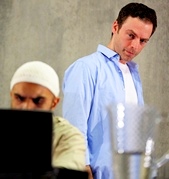A CurtainUp Review
The Invisible Hand
By Elyse Sommer
|
. . . At the end of the day, everybody's self-interest works as a check against everyone else's. Shorts keep longs honest. Vice versa. That's what they call the invisible hand.— The imprisoned Nick explaining the free market practice of short selling to his captor Bashir. Money makes the world go around It makes the world go 'round. A mark, a yen, a buck, or a pound . . .Is all that makes the world go around — Lyric from Kander and Ebb's Cabaret. |

Usman Ally & Justin Kirk. (Photo: Joan Marcus)
|
It's unlikely that a kidnapped American would have Nick's option to interact with his captors. Yet, in a world where what once would have seemed impossible has come to pass, Ahktar's plot is no more contrived than Disgraced's designed to explode dinner party. Given the daily horror stories about beheadings of kidnap victims, calling The Invisible Hand timely is an understatement. To make it painfully on the mark, two more hostages were killed on the very day I attended a matinee performance. To add relevance to that December 7th viewing, Ashkar's Nick traces America's role as the "world's bank" to the thirty years following the end of the war that began on that day.
While the four actors represent divergent backgrounds, the play's overarching issue is how, in one way or another, money is at the base of all their dreams, frustrations and actions. As Nick puts it: "I've been around money a long time. And I've seen a lot of things. But there's one thing that doesn't change. What money does to people. When you get a taste, you want more. As Imam Saleem (Danush Kashani) sees it "Money is the opiate of the people, not religion. Money is what puts people to sleep when it comes to the moral dimension of life." In light of the way the script has him exit the story, this is as likely to apply to his own disciples as foreigners like Nick.
' As was the case for Disgraced, both off and on Broadway, The Invisible Hand has been given the benefit of a director (Ken Rus Schmoll) who knows how to mine the text for a brisk, suspenseful production that's an escape thriller but also an exploration of the ups and downs of the relationship between the two main characters, Nick and Bashir.
I never saw Justin Kirk in the popular TV series Weeds but he first impressed me in a 2-hander called Old Wicked Songs . It's a pleasure to see him back in a small Off-Broadway theater. Usman Ally, lives up to the promise shown in The Elaborate Entrance of Chad Deity . Both actors fully embody the complexities of their characters — shifting easily from cool, to charismatic to crazed with anger and or fear.
Danush Kashani's does fine work as Bashir's leader, Imam Salem. His extensive experience includes a part in Tony Kushner's prescient Homebody Kabul . The smallest role of Dar, marks a promising off-Broadway debut for Jameal Ali.
Leah Gelpe's sound design lends pulsating aural support to the suspenseful between scenes pauses. However, Riccardo Hernandez's set struck me as unnecessarily complicated, and Tyler Micoleau's lighting obstructed rather enhanced close-up views of the actors' faces (one of the delights of seeing a play in a small theater like this where ever seat is a premium seat). Watching the extensive work needed to change to the even more technically intricate second act setting, I found myself envisioning all this done more simply and cost effectively. Sometimes less is indeed more.
To get back to the main event, the play . . . while the end at first struck me as somewhat too abrupt and seeming to need something more conclusive, by the time I got on the subway to go home, that inconclusiveness made perfect sense. These global nightmares are ongoing, and will take years to resolve themselves.
Anyone looking for a glimmer of hope would do well to read New York Times columnist Thomas Friedman's piece (also published on December 7th) "How Isis Drives Muslims From Islam." And anyone interested in thought provoking theater, would be well advised to nab a ticket and head for the Bowery.
|
The Invisible Hand by Ayad Akhtar Directed by Ken Rus Schmoll Cast: Jameal Ali (Dar), Usman Ally (Bashir), Dariush Kashani(Imam Saleem) Justin Kirk (Nick Bright) Scenic design: Riccardo Hernandez Lighting design: Tyler Micoleau Sound design: Leah Gelpe Dialect Coach: Stephen Gabis Fight Director Thomas Schall Stage Manager: Megan Schwarz Dickert Running Time: 2 hours includes 1 intermission New York Theatre Workshop 79 East Fourth Street From 11/19/14; opening 12/08/14; closing 1/05 Reviewed by Elyse Sommer at December 7th press preview |
|
REVIEW FEEDBACK Highlight one of the responses below and click "copy" or"CTRL+C"
Paste the highlighted text into the subject line (CTRL+ V): Feel free to add detailed comments in the body of the email. . .also the names and emails of any friends to whom you'd like us to forward a copy of this review. For a feed to reviews and features as they are posted add http://curtainupnewlinks.blogspot.com to your reader Curtainup at Facebook . . . Curtainup at Twitter Subscribe to our FREE email updates: E-mail: esommer@curtainup.comesommer@curtainup.com put SUBSCRIBE CURTAINUP EMAIL UPDATE in the subject line and your full name and email address in the body of the message. If you can spare a minute, tell us how you came to CurtainUp and from what part of the country. |

|


 Book of Mormon -CD
Book of Mormon -CD